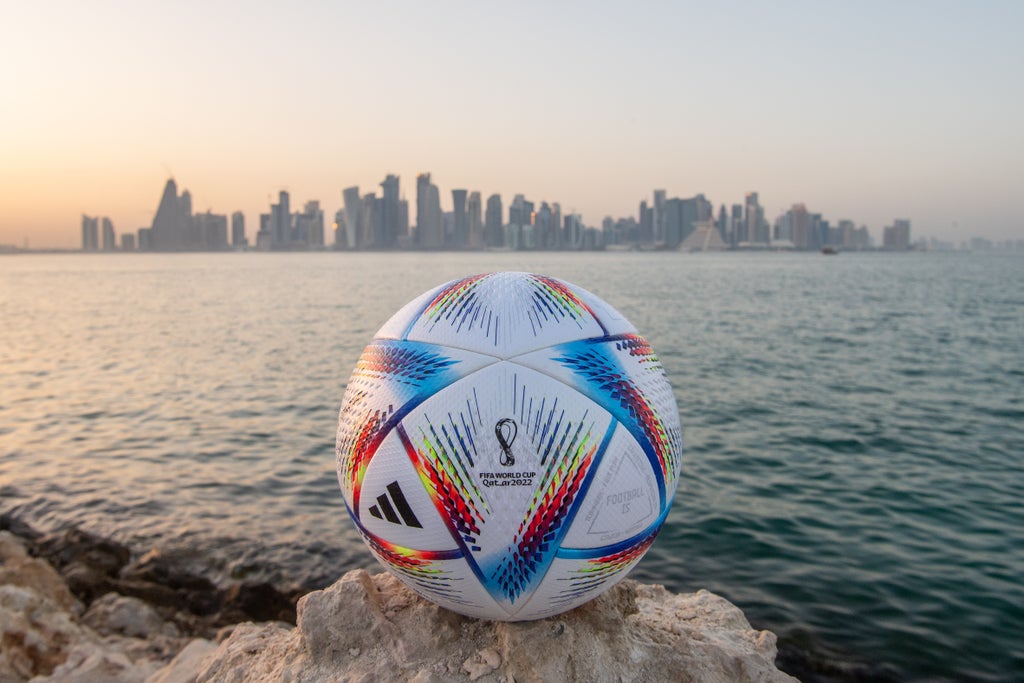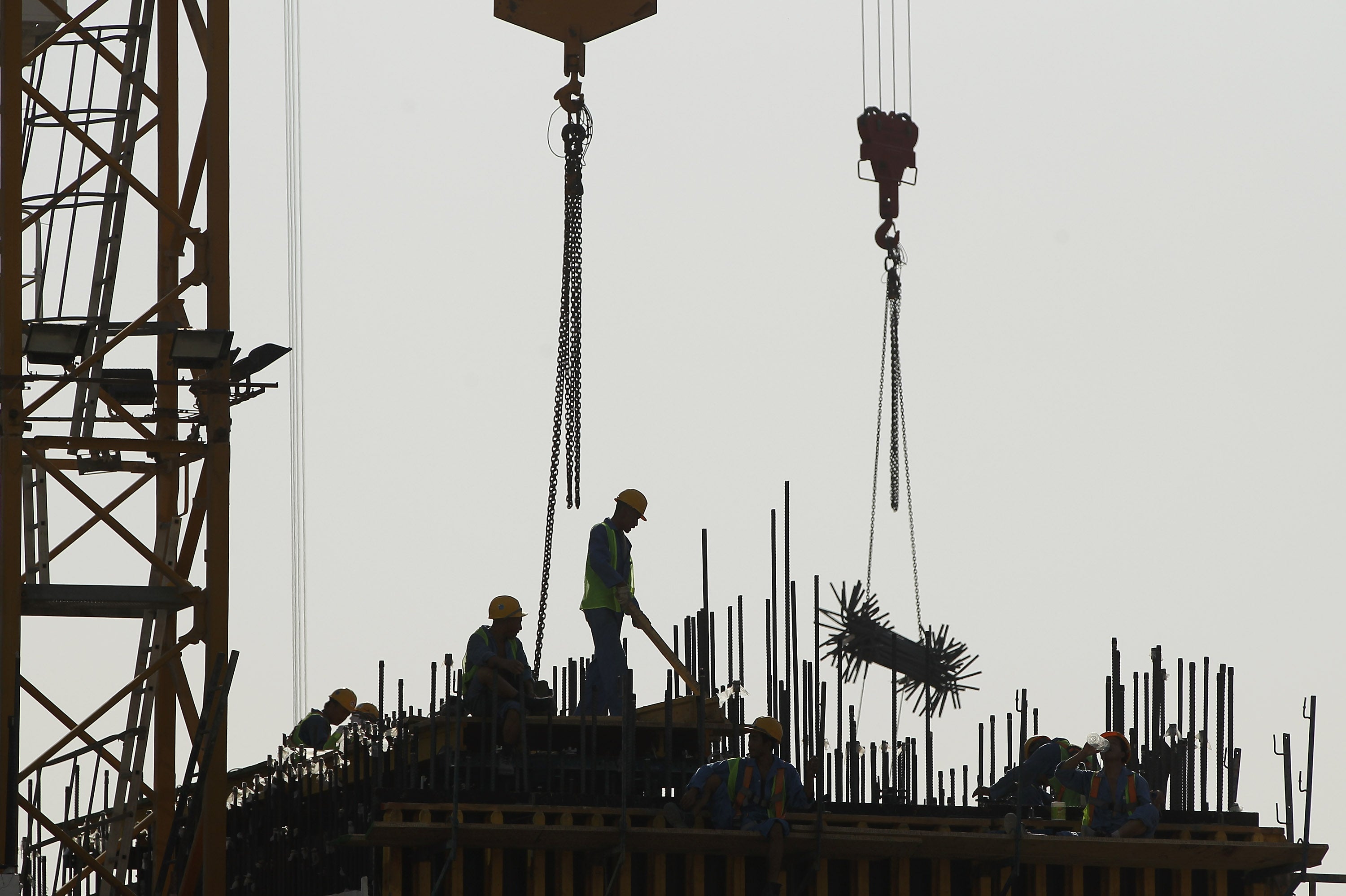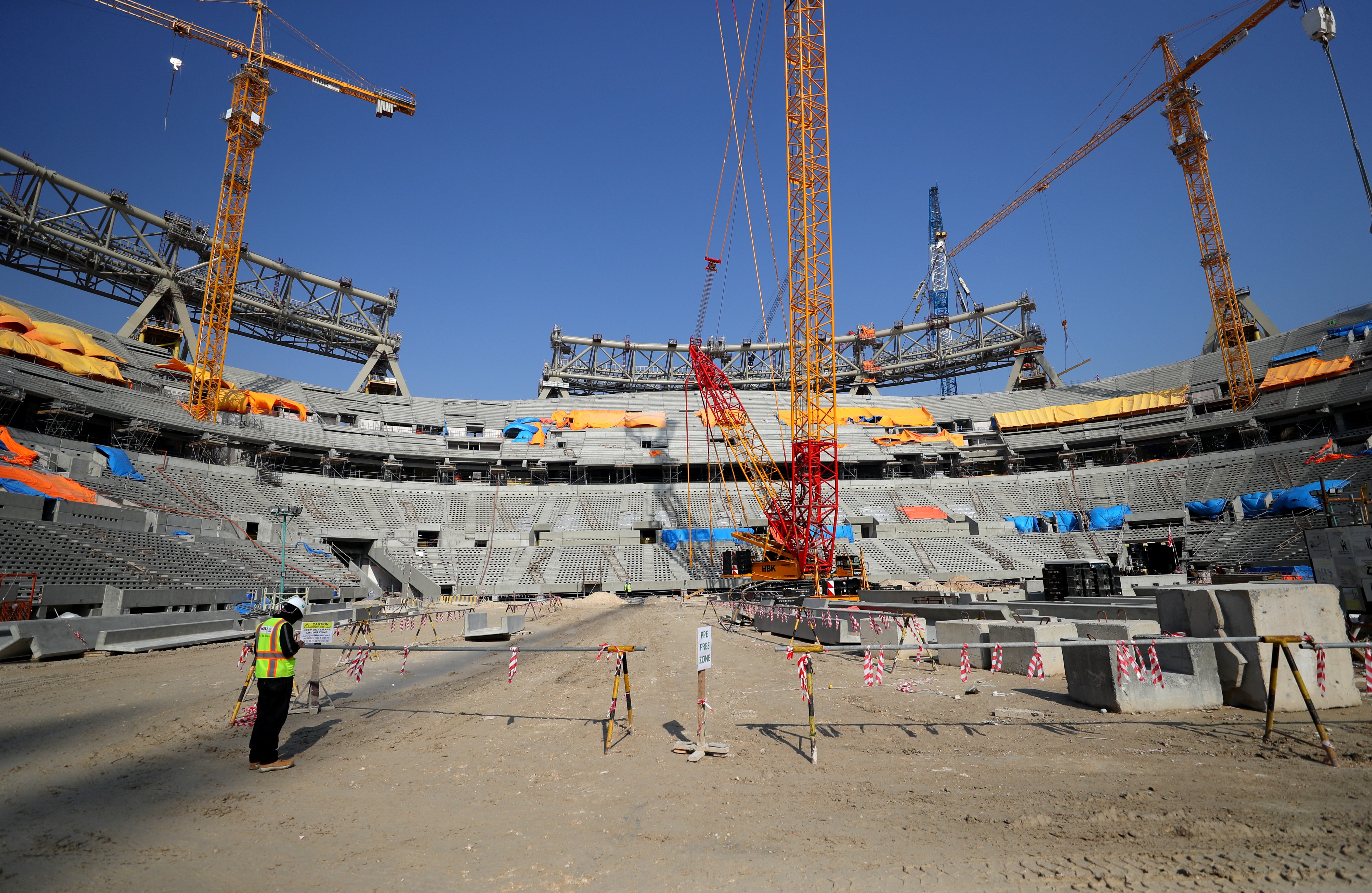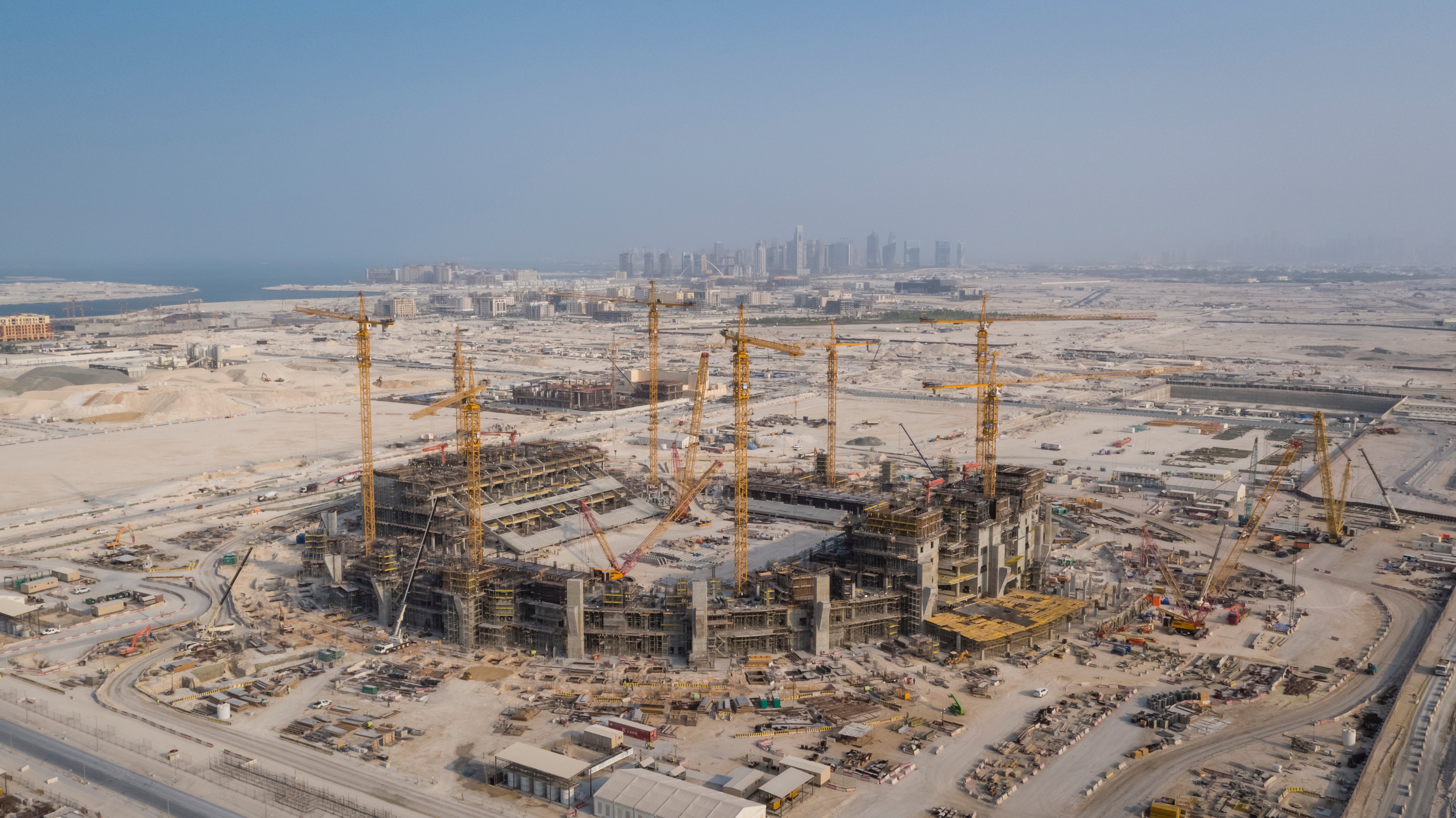
Migrant workers at private security firms in Qatar are still subject to “forced labour” and a number of other labour abuses, according to a damning new Amnesty International report, that criticised Fifa for failing “to put in place adequate processes” to prevent the problems.
The governing body and Supreme Committee have been urged to “press Qatar to urgently implement all its labour reforms” now, with the World Cup just over six months away.
The conclusions demolish Qatar 2022’s abrasive appeals to reform, and how critics must “educate themselves”, from last week’s World Cup draw.
Among the findings that came from interviews with 59 former and current employees across eight companies, right up to February 2022, were:
- Pay discrimination on the basis of nationality, race and language
- Substandard and “unsanitary” living conditions with up to 10 people sharing cramped rooms
- A high majority of security guards working 12 hours a day, with no days off, for months and even years on end
- Workers being threatened with large salary deductions if they want to take rest days
- Huge fines for mistakes at work
- Forced work outside without shelter in searing heat
- Half of the security companies not paying overtime at the rate required by law
- All eight of the private security companies “failed to meet their responsibility to respect human rights under international standards and have breached various provisions of Qatar law.

Most pointedly, it is alleged that a lack of adequate due diligence meant that “Fifa and its organising partner had already benefited from these companies’ services” by the time some abuses had been identified.
The report states that, “despite important labour reforms of the kafala sponsorship system” since 2017, “abuses in this sector remain systemic and structural”.
One section reads: “In particular, the report finds that the two key elements of forced labour as internationally defined - involuntary work and threat of penalty - appear to be present in the operations of six of the companies. Their widespread presence demonstrates that Qatar is failing to meet its obligations under the International Labour Organisation (ILO) Convention on Forced Labour to “suppress” the use of forced labour in all its forms as soon as possible…”
The report specifically states that it is now concentrating on private security firms due to the fact work on the World Cup stadiums is “virtually complete”, so “focus must turn to all those who will provide the services essential for the tournament. The private security firms employ tens of thousands of migrant workers and the report found a huge proportion continue to be subjected to “serious labour abuses that sometimes amount to forced labour”, with an alarming “degree of consistency about the patterns of treatment reported”.

“Fundamentally,” the report reads, “labour abuses have been allowed to continue and flourish due to the government’s failure to adequately address the challenges” and “properly enforce laws and regulations”.
More than 85% of security guards interviewed frequently worked up to 12 hours a day, with over 80% saying their employers had regularly denied them or colleagues a weekly rest day for months on end. Many said they couldn’t remember their last day off.
With names changed, one interviewee said: “Working 12 hours here is like normal. You are like a programmed computer; you just get used to it. You feel it is normal, but it’s not really normal.”
Half of the interviews said that those who did take rest days against their employers’ wishes risked deduction of between one and six days’ basic pay, from a monthly salary that tends to be no more than £210. Workers in six of the companies said that their employer could also dock wages if they took sick days. Many feared deportation if they complained.
“When you claim sickness… they will say ‘go, go go, or we will penalise you and mark you as absent,” one guard at a high-profile sports facility in Doha says.
Denying employees their right to rest through the threat of financial penalty if they do not report to work, or compelling them to work when ill, can amount to forced labour under the ILO Convention on Forced Labour.
Reflecting how ingrained the culture of the kafala system is, the report reads: “the enduring employer-worker power balance - which is facilitated by lingering aspects of Qatar’s inherently abusive sponsorship system… puts guards at huge risk of punishment if they challenge their supervisor’s decisions, no matter how illegal they are”.
It cites one case of a worker being fined the equivalent of six days’ wages for studying to obtain a health and safety training certificate in his spare time.

More than a third of interviewees from five companies meanwhile say that they are treated differently depending on nationality, race or language, including pay and working conditions.
“They pay us by nationality,” one guard who works at the offices of a sporting body says. “You may find a Kenyan is earning 1,300 [riyals], but the same security from the Philippines gets 1,500. Tunisians, 1,700. Pay is according to nationality.”
“We tell them we are facing discrimination,” another testimony reads. “They say ‘what is discrimination?’”
The statements reflect the findings of the UN Special Rapporteur on contemporary forms of racism following her visit to Qatar at the end of 2019, which raised “serious concerns of structural racial discrimination” against “South Asian and sub-Saharan African nationalities”.
In response to the allegations, Qatar’s Ministry of Labour said last month that they “do not represent underlying issues with the robust system Qatar has introduced, and that the prevalence of rule-breaking by companies is in decline.
The Supreme Committee meanwhile stated that “a programme of the scale of the SCs, which is unique even from an international perspective, will always have contractors who will try to bypass the system”.
In response to the report, Fifa released a statement to The Independent:
“Fifa is steadfast in its commitment to ensure respect for internationally recognised human rights across all its operations and events in accordance with Fifa’s Human Rights Policy and the UN Guiding Principles on Business and Human Rights. Fifa does not accept any abuse of workers by companies involved in the preparation and delivery of the Fifa World Cup 2022.
“To that end, a robust system of pre- and post-contracting audits and enforcement has been put in place by the Supreme Committee for Delivery & Legacy (SC), Fifa and the Fifa World Cup Qatar LLC (Q22) for both construction sites and companies providing services for Fifa competitions hosted in Qatar. This included the integration of relevant requirements in tender processes by the three entities, pre-contract auditing of accommodation facilities and recruitment practices, and event-time audits during the Fifa Club World Cup 2020 and the qualifiers and finals of the Fifa Arab Cup 2021. During the event-time inspections, contractors that failed to comply with the required standards were identified and the issues found addressed on the spot, with some additional matters being followed up after the competition through Fifa, Q22, the SC and the Ministry of Labour.
“Fifa and the other tournament organisers are currently focusing on the roll-out of the audit and inspection programme to enforce compliance with the SC’s Workers’ Welfare Standards for more than 150 hotels in the country, as well as on pre-contract audits for the other service companies deployed at the FIFA World Cup Qatar 2022. This includes security companies who will be deployed on Fifa World Cup sites as well as companies providing security services for hotels and other companies linked to the Fifa World Cup 2022.
“We see a good level of commitment and collaboration by many service companies and the programme has already now had tangible benefits for thousands of workers. At the same time, we refuse to work with companies who fail to show commitment to live up to the Fifa World Cup standards and do not shy away from taking strong measures against such companies in collaboration with the Ministry of Labour.
“As part of its regular and ongoing engagement with Amnesty International in relation to the upcoming World Cup, Fifa has provided detailed information about the cases mentioned in their report and the corrective measures that have been applied with the companies involved.”
As regards what next, the report implores Qatar to ensure all private security companies pay employees in full and permit rest days, while investigating labour abuses and publishing the findings.
Amnesty also urge Fifa and the Supreme Committee to “press Qatar to urgently implement all its labour reforms to date and effectively enforce the Labour Law”.







